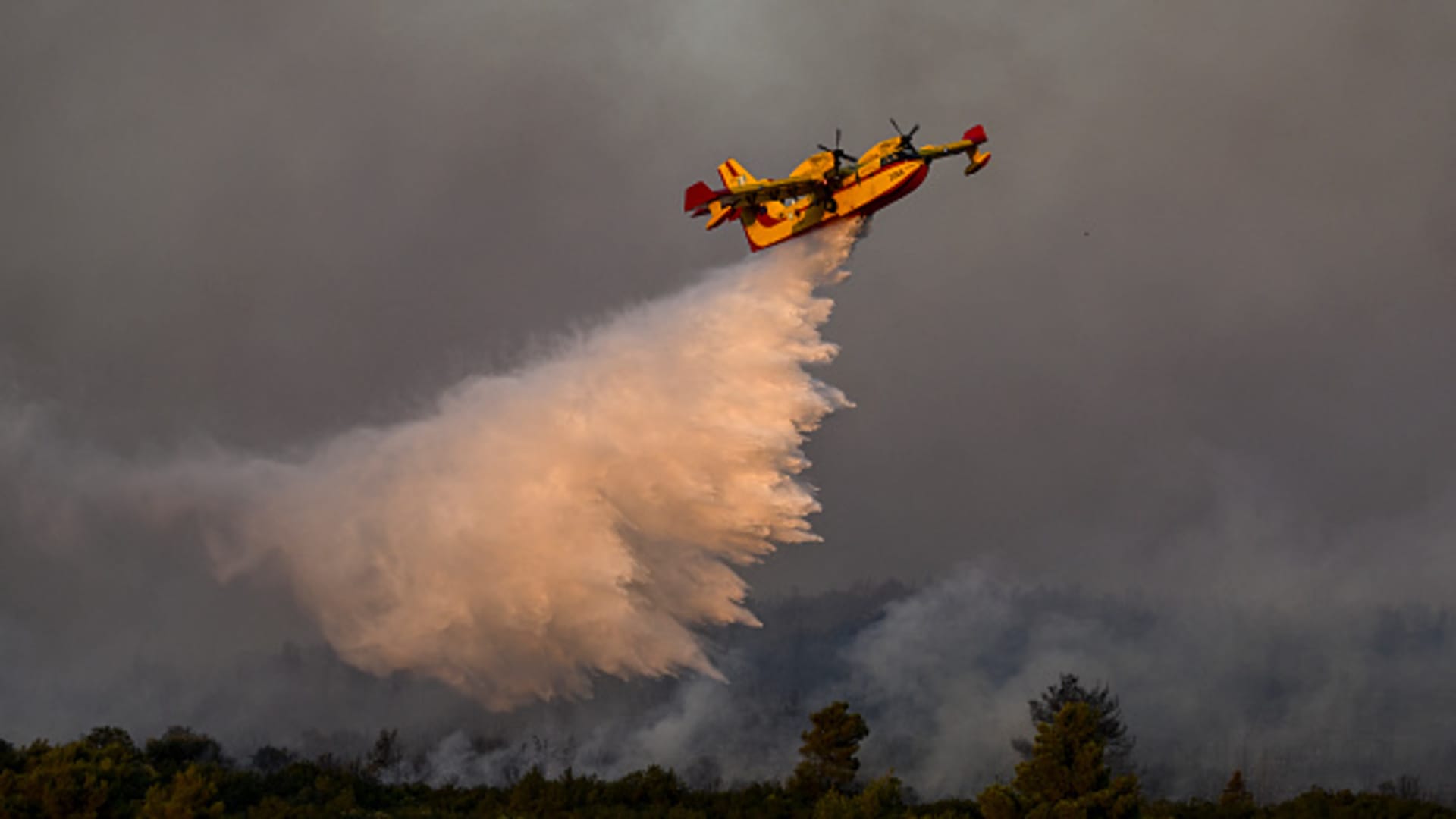A Canadair CL-415 sprays water during a wildfire in the village of Pournari, near Athens, on July 18, 2023.
Aris Messinis | Afp | Getty Images
The European Union sent four Canadair water bombers to help Greece fight wildfires that have been raging for a third day on Wednesday, while authorities warned of another extraordinary heat wave.
It comes as scorching heat continues to grip southern Europe, with temperatures in Spain, France and Italy climbing to fresh record highs.
Italy’s capital of Rome recorded its hottest day ever on Tuesday, as temperatures in the city center rose to a staggering 41.8 degrees Celsius (107.24 Fahrenheit) — surpassing the previous record of 40.7 degrees Celsius registered in June last year.
Mercury levels in Girona in Spain’s Catalonia region hit a record 45 degrees Celsius, while temperatures in Verdun in northeast France reached 40.6 degrees Celsius for the first time.
Europe’s hottest-ever recorded temperature is believed to have been 48.8 degrees Celsius, logged near the ancient city of Syracuse on the coast of Sicily in August 2021.
The World Meteorological Organization believes this record could soon be broken, as the heat wave is expected to intensify.
Tourists use umbrellas to protect themselves from the sun at Colosseo area (Colosseum), during the ongoing heat wave in Rome, Italy. Many places in Italy have seen successive days over 40C.
Stefano Montesi – Corbis | Getty Images News | Getty Images
It comes shortly after the planet registered its hottest day since records began for the third time in just four days earlier this month, while both the U.S. and China saw temperatures climb above 50 degrees Celsius in recent days.
Climate scientists say the recent spate of global heat records underlines the increasing urgency to slash greenhouse gas emissions as quickly and as deeply as possible.
‘Devastating consequences’
In Greece, emergency workers continued to try to contain wildfires raging near Athens, with Reuters reporting Wednesday that air water bombers were deployed over the towns of Mandra, an outer suburb to the west of the capital, and Loutraki, a seaside resort close to the Corinth canal that separates mainland Greece from the Peloponnese.
Strong winds in recent days have hindered firefighters’ efforts to bring the flames under control.
The European Commission Civil Protection and Humanitarian Aid said via Twitter on Tuesday that Greece had requested the activation of the EU Civil Protection Mechanism — a scheme designed to support countries stricken by natural disasters.
In response, the EU said it had deployed four Canadair water bombers from its fleet based in France and Italy to battle the wildfires ravaging Greece’s western Attica region. The bloc also sent firefighters based in Romania.
Locals watch the fires as they approach the village of Pournari, in the area of Magoula, some 25km southwest of the Greek capital Athens on July 18, 2023.
Spyros Bakalis | Afp | Getty Images
In a separate update on Wednesday, the EU said it had sent a total of 220 firefighters and 65 vehicles to contain the tens of wildfires spreading across Greece.
“We are experiencing a heatwave across Southern Europe already causing devastating consequences in Greece, with thousands of hectares burned in a short period of time,” EU Commissioner for Crisis Management Janez Lenarčič said in a statement.
“It is important to continue to invest in prevention and to enhance the wildfire risk awareness of the population,” Lenarčič said.
Winds fanning the fires, according to the Greek meteorological service, were likely to intensify on Wednesday before abating on Thursday when temperatures — fueled by a new heat wave — are set to rise further.
Temperatures in the Ionian islands and in the western mainland of Greece were predicted to reach 40 degrees Celsius on Wednesday.
The Hellenic National Meteorological Service said temperatures would pick up further from Thursday, with peak temperatures of around 43 degrees Celsius in the western Sterea and in the western Peloponnese regions.

